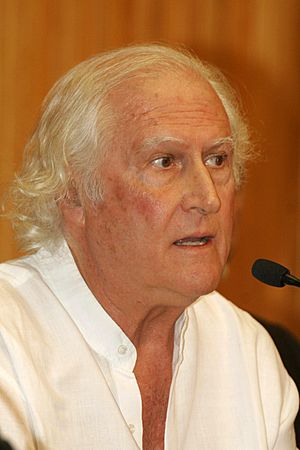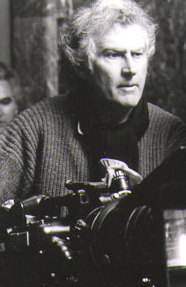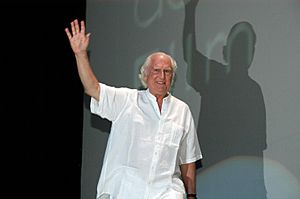Fernando Solanas facts for kids
Quick facts for kids
Fernando Solanas
|
|
|---|---|

Solanas at the Guadalajara Film Festival, 2008
|
|
| Argentine Ambassador to UNESCO | |
| In office 10 December 2019 – 6 November 2020 |
|
| Preceded by | Rodolfo Terragno |
| Succeeded by | Marcela Losardo |
| National Senator | |
| In office 10 December 2013 – 10 December 2019 |
|
| Constituency | City of Buenos Aires |
| National Deputy | |
| In office 10 December 2009 – 10 December 2013 |
|
| Constituency | City of Buenos Aires |
| Personal details | |
| Born | 16 February 1936 Olivos, Buenos Aires, Argentina |
| Died | 6 November 2020 (aged 84) Neuilly-sur-Seine, France |
| Cause of death | COVID-19 |
| Political party | Broad Front (1993–1994) Proyecto Sur (2007–2020) |
| Other political affiliations |
South Alliance (1995) Broad Front UNEN (2013–2015) Creo (2017) Frente de Todos (2019–2020) |
| Occupation | Film director, screenwriter, politician |
Fernando Ezequiel "Pino" Solanas (born February 16, 1936 – died November 6, 2020) was a famous Argentine film director, screenwriter, and politician. He was known for making movies that explored important social and political issues. Some of his well-known films include La hora de los hornos (1968), Tangos: el exilio de Gardel (1985), and Memoria del saqueo (2004).
Besides his film career, Solanas also served as a National Senator for the Autonomous City of Buenos Aires for six years, from 2013 to 2019. He later became Argentina's ambassador to UNESCO.
Contents
His Early Life and Creative Start
Fernando Solanas studied theatre, music, and law. In 1962, he directed his first short film called Seguir andando.
His first full-length film, La Hora de los Hornos, was made secretly in 1968. This documentary was about neo-colonialism and violence in Latin America. It won many international awards and was shown all over the world.
Solanas won important prizes at major film festivals. These included the Grand Jury Prize and the Critics Award at the Venice Film Festival. He also received the Prix de la mise en scène at the Cannes Film Festival. In 2004, he was given a special Honorary Golden Bear award at the Berlin Film Festival. He also worked with the famous tango musician Ástor Piazzolla on music for some of his movies.
Filmmaking for Change: Third Cinema
Solanas was a leader of a group called Grupo Cine Liberación. This group changed Argentine cinema in the 1970s. They wanted movies to have a strong social message and political voice.
Along with Octavio Getino, Solanas wrote a very important idea called "Toward a Third Cinema". This idea suggested that movies could be a tool for political change. It was different from big Hollywood movies and also from art-focused European films. This idea inspired filmmakers in many developing countries to make movies that spoke up for their communities.
During the 1970s, Solanas faced threats because of his work. One of his actors was sadly killed, and he himself was almost kidnapped. Because of these dangers, Solanas went to live in Paris in 1976. He returned to Argentina in 1983 when democracy came back to the country.
From Films to Politics
Even after returning to Argentina, Solanas continued to make political films. He was a strong critic of Carlos Menem, who was the Argentine President at the time.
In 1991, just three days after he publicly criticized the president, Solanas was shot six times in his legs. The people responsible were never caught. Despite this difficult attack, Solanas became even more involved in politics. In 1992, he ran to be a Senator for Buenos Aires. The next year, he was elected as a National Deputy.
Solanas kept making films, including La Dignidad de los Nadies (2005) and La última estación (2008). His son, Juan Solanas, also became a well-known film director.
In 2007, Solanas ran for president of Argentina. He received a good number of votes, showing his growing support. In 2009, he was elected as a National Deputy for Buenos Aires. Then, in 2013, he became a National Senator, representing Buenos Aires City until 2019.
After his time as a senator ended in 2019, he was appointed as Argentina's ambassador to UNESCO. He served in this important role until his death. Fernando Solanas passed away on November 6, 2020, in Neuilly-sur-Seine, France, due to COVID-19.
Filmography
- Seguir andando (1962) (short film)
- Reflexión ciudadana (1963) (short film)
- La hora de los hornos (The Hour of the Furnaces) (1968)
- Argentina, Mayo de 1969: los caminos de la liberación (1969)
- Perón, la revolución justicialista (1971)
- Perón: actualización política y doctrinaria para la toma del poder (1971)
- Los hijos de fierro (1972)
- La mirada de los otros (1980) (Filmed in Paris, France)
- El exilio de Gardel (Tangos) (1985)
- Sur (1988)
- El viaje (1992)
- La nube (1998)
- Afrodita, el sabor del amor (2001)
- Memoria del saqueo (2004)
- La dignidad de los nadies (2005)
- Argentina latente (2007)
- La próxima estación (2008)
- La tierra sublevada (2009)
Accolades
Fernando Solanas received many awards for his films. Here are some of the most notable ones:
- Venice Film Festival: Grand Special Jury Prize (1985), CinemAvvenire Award (1998), UNESCO Award (1998), Award of the City of Rome (2005), Doc/It Award (2005), Human Rights Film Network Award (2005).
- Montréal World Film Festival: Grand Prix Special des Amériques (2001).
- Mannheim-Heidelberg International Filmfestival: Interfilm Award (1968).
- Havana Film Festival: Special Jury Prize (2007), Memoria Documentary Award (2005), Saúl Yelín Award (2005, 1998), CARACOL Award (1998), Honorary Award (1998), Special Jury Prize (1992), Grand Coral - First Prize (1988, 1985).
- Cannes Film Festival: Prize of the Ecumenical Jury - Special Mention (1992), Technical Grand Prize (1992), Audience Award (1990, 1989), Best Director (1988).
- British Film Institute Awards: Sutherland Trophy (1972).
- Berlin International Film Festival: Honorary Golden Berlin Bear (2004), FIPRESCI Prize - Special Mention (1971).
- Argentinean Film Critics Association Awards: Silver Condor for Best Director (1987), Silver Condor for Best Music (1987).
- Academy of Motion Picture Arts and Sciences of Argentina: Award of the Argentinean Academy for Best Documentary (2008).
Quotes
"The possibility of making a new cinema completely outside the system depends on whether or not filmmakers can transform themselves from 'directors' into total filmmakers. And no one can become a total filmmaker without being a film technician, without being capable of handling the production." "We realized that the important thing was not the film itself but that which the film provoked."
See also
 In Spanish: Pino Solanas para niños
In Spanish: Pino Solanas para niños
 | Janet Taylor Pickett |
 | Synthia Saint James |
 | Howardena Pindell |
 | Faith Ringgold |



